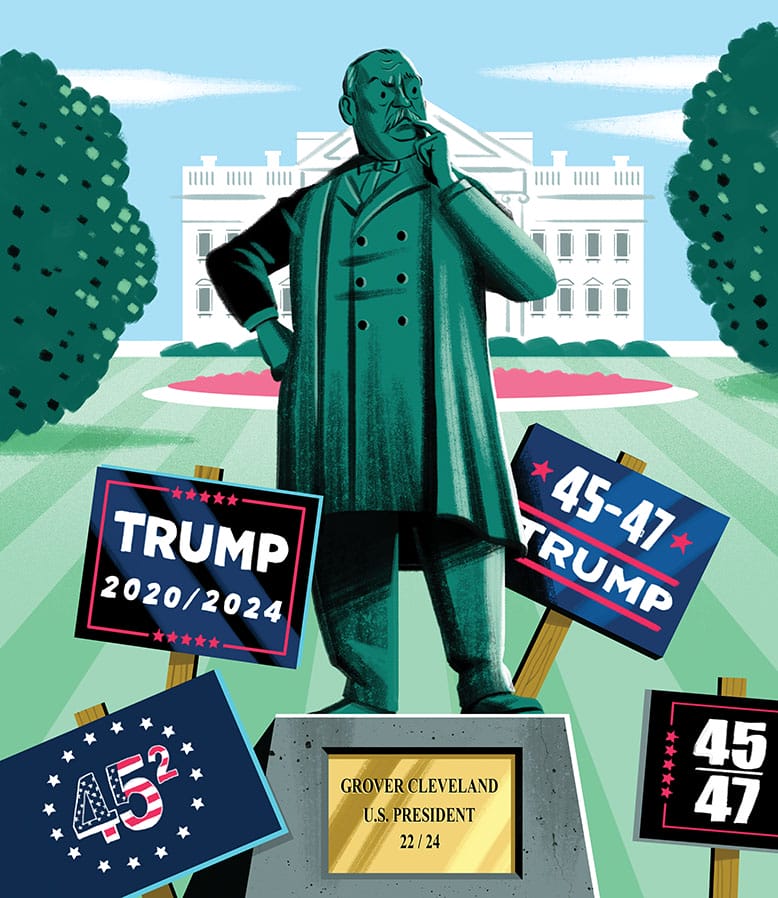
Illustration: Ben Kirchner
Grover Cleveland—the only president born (and buried) in New Jersey—is widely remembered for serving split terms in the White House. If Donald Trump wins a second term as president in November, Cleveland will lose that distinction.
While this might seem trivial to some, it’s a gut punch for George Cleveland, Grover’s 72-year-old grandson.
The split term is “Grover’s most-used question on Jeopardy,” says George. “If Trump wins, we would lose that.”
The differences between Cleveland and Trump are stark—although the two are not lacking in similarities. Cleveland, a Democrat, was born in New Jersey, but built his reputation as a corruption fighter in New York, where he served as mayor of Buffalo and governor. Trump, a Republican, was born in New York, but built his national brand in New Jersey, where he put his name on three Atlantic City casinos and multiple golf courses.
Cleveland was an avid outdoorsman who loved to fish and maintained remote family retreats, first in Buzzards Bay, Massachusetts, and later in Tamworth, New Hampshire. Trump’s outdoor activity is golf; his retreat is an opulent resort in Palm Beach, Florida. Cleveland, like Trump, was a tad on the corpulent side. As president, Cleveland was mostly bald. Trump? Well, who knows?
Unlike Trump, Cleveland came to the White House as a bachelor. Trump entered 1600 Pennsylvania Avenue with his third wife on his arm. Cleveland didn’t stay single for long. Fourteen months into his presidency, Cleveland, at 49, married 21-year-old Frances Folsom. Trump was 58 when he married Melania Knauss, then 34, in 2005.
The Clevelands were a devoted couple and had five children together. Trump also has five children—with three different wives. Cleveland had a reputation for integrity, but like Trump was no stranger to scandal. During the election of 1884, the press unearthed rumors that Cleveland had fathered a son out of wedlock. Indeed, Cleveland paid child support to the unwed mother, but history remains unclear on the child’s paternity.
Cleveland won the presidency in 1884, then lost to Benjamin Harrison in 1888 (despite winning the popular vote). Plucked out of political retirement in 1892, he defeated Harrison, earning his historic split term—and “messing up the presidential count,” declares grandson George.
George has his own unique claim. He is believed to be one of only three living grandchildren of 19th-century presidents, the others being his older sister, Frances, and Harrison Tyler, the 96-year-old grandson of John Tyler.
A longtime New Hampshire resident, George has strong emotional ties to New Jersey. He has portrayed his grandfather at several fundraisers for the Grover Cleveland Birthplace Historic Site in Caldwell, and often visits Princeton Cemetery, where Cleveland is buried.
George remains proud of Cleveland’s Garden State connection. “When your grandfather has a rest area named after him on the New Jersey Turnpike,” says George, “it doesn’t get much better than that.”
Ken Schlager is a lecturer at Rutgers University-New Brunswick and a former editor of New Jersey Monthly.
No one knows New Jersey like we do. Sign up for one of our free newsletters here. Want a print magazine mailed to you? Purchase an issue from our online store.



